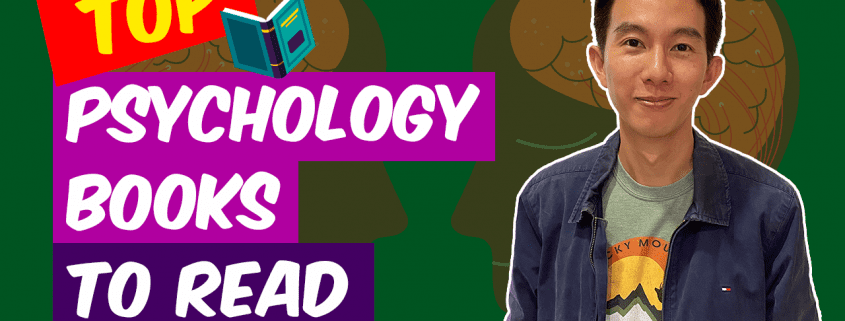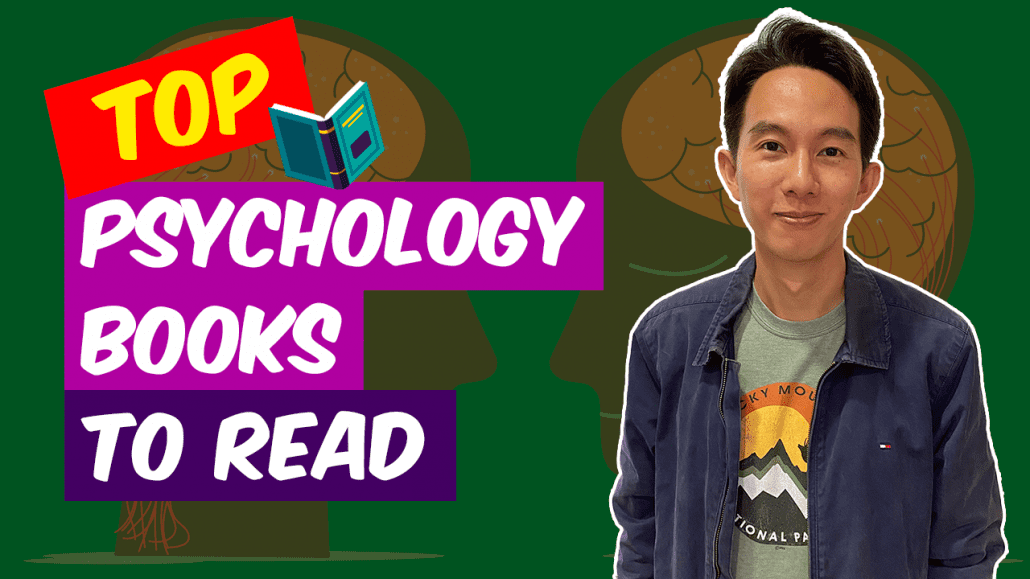Top 76 Psychology Books to Read (With Key Ideas)
Join our Telegram channel for more market analysis & trading tips: t.me/synapsetrading
Psychology is the scientific study of the mind and behavior. It encompasses a wide range of topics, including cognition (thoughts, beliefs, and attitudes), emotion, perception, personality, behavior, and relationships.
There are many reasons why people choose to learn about psychology.
Some may be interested in understanding their own thoughts and behaviors, while others may be interested in helping others through careers in fields such as therapy or counseling.
Studying psychology can also provide insights into the behavior of groups and organizations, which can be useful in fields such as business and education.
Here is a list of all the most influential books on psychology.
-
- “The Interpretation of Dreams” by Sigmund Freud (1899) – This book explores the unconscious mind and the role of dreams in understanding the psyche.
- “The Structure of Scientific Revolutions” by Thomas Kuhn (1962) – This book discusses the nature of scientific progress and the role of paradigms in shaping scientific understanding.
- “The Social Construction of Reality” by Peter L. Berger and Thomas Luckmann (1966) – This book explores the ways in which social forces shape our understanding of reality.
- “On Death and Dying” by Elisabeth Kübler-Ross (1969) – This book discusses the stages of grief and the process of dying.
- “The Selfish Gene” by Richard Dawkins (1976) – This book discusses the concept of gene-centered evolution and the ways in which genes influence behavior.
- “Thinking, Fast and Slow” by Daniel Kahneman (2011) – This book discusses the ways in which our brains process information and the role of biases in decision-making.
- “Man’s Search for Meaning” by Viktor Frankl (1946) – This book discusses the psychological implications of the Holocaust and the importance of finding meaning in suffering.
- “How to Win Friends and Influence People” by Dale Carnegie (1936) – This book offers practical advice on building relationships and influencing others.
- “The Diaries of Søren Kierkegaard” by Søren Kierkegaard (1843-1855) – These diaries offer insights into Kierkegaard’s thoughts on religion, philosophy, and psychology.
- “The Theory of Moral Sentiments” by Adam Smith (1759) – This book discusses the nature of moral judgment and the role of empathy in moral decision-making.
- “The Prince” by Niccolò Machiavelli (1532) – This book offers practical advice on leadership and political strategy.
- “The Power of Now” by Eckhart Tolle (1997) – This book discusses the importance of mindfulness and living in the present moment.
- “The Art of Loving” by Erich Fromm (1956) – This book discusses the nature of love and how it can be cultivated and nurtured in our lives.
- “The Nature of Prejudice” by Gordon Allport (1954) – This book explores the nature of prejudice and the ways in which it can be reduced.
- “The Cognitive Style of PowerPoint” by Edward Tufte (2003) – This book discusses the ways in which PowerPoint can influence and shape the way we think and communicate.
- “The Demon-Haunted World” by Carl Sagan (1995) – This book discusses the importance of critical thinking and skepticism in the face of pseudoscience and superstition.
- “The Man Who Mistook His Wife for a Hat” by Oliver Sacks (1985) – This book discusses the case studies of people with neurological disorders, offering insights into the nature of the human mind and brain.
- “The Tao of Pooh” by Benjamin Hoff (1982) – This book uses the character of Winnie the Pooh to explore the principles of Taoism.
- “The Myth of Sisyphus” by Albert Camus (1942) – This book discusses the concept of the absurd and the importance of finding meaning in life.
- “The Art of War” by Sun Tzu (5th century BC) – This book offers practical advice on strategy and conflict resolution.
- “The Science of Happiness” by Dacher Keltner and Jason Marsh (2018) – This book discusses the ways in which happiness can be cultivated and sustained.
- “The Nature of Statistical Learning Theory” by Vladimir Vapnik (1995) – This book discusses the mathematical foundations of machine learning.
- “The Structure of Personality” by Henry Murray (1938) – This book discusses the concept of personality and the ways in which it can be measured and studied.
- “The Mismeasure of Man” by Stephen Jay Gould (1981) – This book critiques the scientific basis of intelligence testing and the ways in which it has been used to justify discrimination.
- “The Antidote” by Oliver Burkeman (2013) – This book discusses the benefits of embracing negative emotions and the importance of accepting the inevitable difficulties of life.
- “The Science of Persuasion” by Robert Cialdini (2001) – This book discusses the psychological principles of persuasion and how they can be applied in marketing and other contexts.
- “The Science of Happiness at Work” by Shawn Achor (2016) – This book discusses the ways in which happiness can improve performance in the workplace.
- “The Mindful Way through Depression” by Mark Williams et al. (2007) – This book offers a mindfulness-based approach to managing depression.
- “The Mind’s Eye” by Oliver Sacks (2010) – This book discusses the ways in which the brain processes visual information and the impact of vision disorders.
- “The Science of Trust” by John Gottman (2011) – This book discusses the role of trust in relationships and the ways in which it can be strengthened.
- “The Hidden Brain” by Shankar Vedantam (2010) – This book discusses the ways in which unconscious biases and processes shape our thoughts, decisions, and behaviors.
- “The Science of Evil” by Simon Baron-Cohen (2011) – This book discusses the psychological and biological basis of evil behavior and how it can be understood and prevented.
- “The Mind Map Book” by Tony Buzan (1994) – This book discusses the use of mind maps as a tool for organizing and synthesizing information.
- “The Science of Happiness” by Rick Hanson (2017) – This book discusses the ways in which happiness can be cultivated and sustained through practices such as mindfulness and gratitude.
- “The Science of Well-Being” by Laurie Santos (2020) – This book discusses the psychological principles of well-being and how they can be applied in our lives.
- “The Science of Success” by Charles Duhigg (2017) – This book discusses the psychological and scientific factors that contribute to success in various areas of life.
- “The Science of Social Influence” by Robert Cialdini (2007) – This book discusses the psychological principles of social influence and how they can be applied in various contexts.
- “The Science of Emotion” by David Caruso and Peter Salovey (2018) – This book discusses the scientific study of emotions and the ways in which they can be understood and managed.
- “The Science of Persuasion” by Kevin Dutton (2018) – This book discusses the psychological principles of persuasion and how they can be applied in various contexts.
- “The Science of Social Connection” by Matthew Lieberman (2020) – This book discusses the importance of social connection and the ways in which it can be cultivated and maintained.
- “The Science of Trust” by Kerstin Dautenhahn (2020) – This book discusses the role of trust in social interactions and the ways in which it can be fostered and maintained.
- “The Science of Decision-Making” by Paul Slovic (2010) – This book discusses the psychological factors that influence decision-making and the ways in which they can be understood and managed.
- “The Science of Change” by James O. Prochaska (1994) – This book discusses the stages of change and the ways in which individuals can successfully navigate through them.
- “The Science of Happiness” by Dan Gilbert (2006) – This book discusses the psychological factors that influence happiness and the ways in which it can be cultivated and sustained.
- “The Science of Empathy” by Simon Baron-Cohen (2004) – This book discusses the psychological and biological basis of empathy and the ways in which it can be cultivated and strengthened.
- “The Emotional Brain” by Joseph LeDoux (1996) – This book discusses the neurobiology of emotion and its role in shaping behavior and decision-making.
- “The Architecture of Happiness” by Alain de Botton (2006) – This book discusses the role of design and aesthetics in shaping our happiness and well-being.
- “The Better Angels of Our Nature” by Steven Pinker (2011) – This book discusses the historical and psychological factors that have contributed to the decline of violence and aggression.
- “The Broken Brain” by Nancy C. Andreasen (1984) – This book discusses the relationship between mental illness and brain function.
- “The Brain That Changes Itself” by Norman Doidge (2007) – This book discusses the plasticity of the brain and the ways in which it can change and adapt.
- “The Brain’s Way of Healing” by Norman Doidge (2015) – This book discusses the ways in which the brain can heal itself and the role of neuroplasticity in this process.
- “The China Study” by T. Colin Campbell (2005) – This book discusses the relationship between diet and health, and the impact of animal-based protein on the risk of chronic diseases.
- “The Confidence Gap” by Russ Harris (2014) – This book discusses the ways in which lack of confidence can hold us back and offers strategies for building self-confidence.
- “The Conscious Brain” by J. Allan Hobson (1973) – This book discusses the nature of consciousness and the ways in which it can be studied scientifically.
- “The Culture Code” by Daniel Coyle (2018) – This book discusses the factors that contribute to successful teamwork and collaboration.
- “The Developing Person Through the Life Span” by Kathleen Stassen Berger (2017) – This book discusses the psychological and biological development of individuals across the lifespan.
- “The Developing Mind” by Daniel J. Siegel (1999) – This book discusses the ways in which the brain develops and the role of experience in shaping brain function.
- “The Drunkard’s Walk” by Leonard Mlodinow (2008) – This book discusses the role of randomness and probability in shaping our lives and decisions.
- “The End of Overeating” by David Kessler (2009) – This book discusses the role of food industry marketing and the impact of certain foods on the brain in contributing to obesity and other health problems.
- “The End of Stress” by Don Joseph Goewey (2018) – This book discusses the science of stress and offers strategies for managing and reducing stress.
- “The Ego Tunnel” by Thomas Metzinger (2009) – This book discusses the nature of self and the ways in which it is constructed by the brain.
- “The Enneagram” by Helen Palmer (1988) – This book discusses the Enneagram, a personality typing system that identifies nine distinct personality types.
- “The Evolution of Cooperation” by Robert Axelrod (1984) – This book discusses the ways in which cooperation can emerge and be sustained in social interactions.
- “The Feeling of What Happens” by Antonio Damasio (1999) – This book discusses the role of emotions in shaping our experiences and behaviors.
- “The Forgiving Brain” by Robert D. Enright (2010) – This book discusses the psychological and biological benefits of forgiveness and offers strategies for cultivating forgiveness in relationships.
- “The Future of the Mind” by Michio Kaku (2014) – This book discusses the ways in which advances in neuroscience and technology may shape the future of the mind and consciousness.
- “The Gene” by Siddhartha Mukherjee (2016) – This book discusses the history and science of genetics and the ways in which genes influence health and behavior.
- “The Genius of Dogs” by Brian Hare and Vanessa Woods (2013) – This book discusses the cognitive abilities of dogs and the ways in which they have been shaped by evolution and training.
- “The Gift of Therapy” by Irvin Yalom (2002) – This book discusses the principles of effective therapy and the ways in which therapists can facilitate change in their clients.
- “The Happy Brain” by Dean Burnett (2018) – This book discusses the biological and psychological factors that contribute to happiness and offers strategies for cultivating and maintaining happiness.
- “The Hidden Life of Dogs” by Elizabeth Marshall Thomas (1993) – This book discusses the social and cognitive abilities of dogs and the ways in which they communicate with humans and other dogs.
- “The Language Instinct” by Steven Pinker (1994) – This book discusses the innate capacity for language and the ways in which it shapes our thoughts and behaviors.
- “The Leadership Challenge” by James Kouzes and Barry Posner (1987) – This book discusses the principles of effective leadership and offers strategies for developing leadership skills.
- “The Man Who Couldn’t Stop” by David Adam (2014) – This book discusses the science of obsessive-compulsive disorder (OCD) and offers strategies for managing and treating the condition.
- “The Man Who Tasted Shapes” by Richard E. Cytowic (1993) – This book discusses the case of a man with synesthesia, a condition in which sensory experiences are blended together, and the implications for understanding the brain and perception.
- “The Moral Animal” by Robert Wright (1994) – This book discusses the evolutionary basis of morality and the ways in which it shapes human behavior.
In general, learning about psychology can help individuals better understand themselves and others, improve their relationships, and make informed decisions.
It can also provide a deeper understanding of the complexities of the human experience and the ways in which psychological factors influence behavior.
Let me know in the comments below!

If you would like to find more book summaries and recommendations, also check out: “Best Investing & Trading Books of All Time”
 Our flagship mentoring program is suitable for both beginners and advanced traders, covering the 4 strategies which I used over the past 15 years to build up my 7-figure personal trading portfolio.
Our flagship mentoring program is suitable for both beginners and advanced traders, covering the 4 strategies which I used over the past 15 years to build up my 7-figure personal trading portfolio.
 If you're looking for a reputable brokerage that covers all products (SG stocks, US stocks, global stocks, bonds, ETFs, REITs, forex, futures, crypto) and has one of the lowest commissions, this is what I currently use.
If you're looking for a reputable brokerage that covers all products (SG stocks, US stocks, global stocks, bonds, ETFs, REITs, forex, futures, crypto) and has one of the lowest commissions, this is what I currently use.
Spencer is an avid globetrotter who achieved financial freedom in his 20s, while trading & teaching across 70+ countries. As a former professional trader in private equity and proprietary funds, he has over 15 years of market experience, and has been featured on more than 20 occasions in the media.






Leave a Reply
Want to join the discussion?Feel free to contribute!